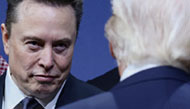▶ PAUL KRUGMAN
Actually, in an ever-changing economy there are always some positions unfilled even while some workers are unemployed, and the current ratio of vacancies to unemployed workers is far below normal. Meanwhile, multiple careful studies have found no support for claims that inadequate worker skills explain high unemployment.
But the belief that America suffers from a severe “skills gap” is one of those things that everyone important knows must be true, because everyone they know says it’s true. It’s a prime example of a zombie idea — an idea that should have been killed by evidence, but refuses to die.
And it does a lot of harm. Before we get there, however, what do we actually know about skills and jobs?
Think about what we would expect to find if there really were a skills shortage. Above all, we should see workers with the right skills doing well, while only those without those skills are doing badly. We don’t.
Yes, workers with a lot of formal education have lower unemployment than those with less, but that’s always true, in good times and bad. The crucial point is that unemployment remains much higher among workers at all education levels than it was before the financial crisis. The same is true across occupations: workers in every major category are doing worse than they were in 2007.
Some employers do complain that they’re finding it hard to find workers with the skills they need. But show us the money: If employers are really crying out for certain skills, they should be willing to offer higher wages to attract workers with those skills. In reality, however, it’s very hard to find groups of workers getting big wage increases, and the cases you can find don’t fit the conventional wisdom at all. It’s good, for example, that workers who know how to operate a sewing machine are seeing significant raises in wages, but I very much doubt that these are the skills people who make a lot of noise about the alleged gap have in mind.
And it’s not just the evidence on unemployment and wages that refutes the skills-gap story. Careful surveys of employers — like those recently conducted by researchers at both M.I.T. and the Boston Consulting Group — similarly find, as the consulting group declared, that “worries of a skills gap crisis are overblown.”
The one piece of evidence you might cite in favor of the skills-gap story is the sharp rise in long-term unemployment, which could be evidence that many workers don’t have what employers want. But it isn’t. At this point, we know a lot about the long-term unemployed, and they’re pretty much indistinguishable in skills from laid-off workers who quickly find new jobs. So what’s their problem? It’s the very fact of being out of work, which makes employers unwilling even to look at their qualifications.
So how does the myth of a skills shortage not only persist, but remain part of what “everyone knows”? Well, there was a nice illustration of the process last fall, when some news media reported that 92 percent of top executives said that there was, indeed, a skills gap. The basis for this claim? A telephone survey in which executives were asked, “Which of the following do you feel best describes the ‘gap’ in the U.S. workforce skills gap?” followed by a list of alternatives. Given the loaded question, it’s actually amazing that 8 percent of the respondents were willing to declare that there was no gap.
The point is that influential people move in circles in which repeating the skills-gap story — or, better yet, writing about skill gaps in media outlets like Politico — is a badge of seriousness, an assertion of tribal identity. And the zombie shambles on.
Unfortunately, the skills myth — like the myth of a looming debt crisis — is having dire effects on real-world policy. Instead of focusing on the way disastrously wrongheaded fiscal policy and inadequate action by the Federal Reserve have crippled the economy and demanding action, important people piously wring their hands about the failings of American workers.
Moreover, by blaming workers for their own plight, the skills myth shifts attention away from the spectacle of soaring profits and bonuses even as employment and wages stagnate. Of course, that may be another reason corporate executives like the myth so much.
So we need to kill this zombie, if we can, and stop making excuses for an economy that punishes workers.
스마터리빙
more [ 건강]
[ 건강]이제 혈관 건강도 챙기자!
[현대해운]우리 눈에 보이지 않기 때문에 혈관 건강을 챙기는 것은 결코 쉽지 않은데요. 여러분은 혈관 건강을 유지하기 위해 어떤 노력을 하시나요?
 [ 건강]
[ 건강]내 몸이 건강해지는 과일궁합
 [ 라이프]
[ 라이프]벌레야 물럿거라! 천연 해충제 만들기
 [ 건강]
[ 건강]혈압 낮추는데 좋은 식품
[현대해운]혈관 건강은 주로 노화가 진행되면서 지켜야 할 문제라고 인식되어 왔습니다. 최근 생활 패턴과 식생활의 변화로 혈관의 노화 진행이 빨라지고
사람·사람들
more
“취미생활로 다진 친목… 선후배들과 만든 모교사랑”
사진러브한인 사진 동호회 사진러브(회장 크리스 고)는 13일 용수산에서 송년모임을 갖고 한 해를 마무리하는 뜻깊은 시간을 가졌다. 이날 모임에…

[홀인원] 이상원 박사
일반외과 전문의 이상원(왼쪽) 박사가 지난 9일 뉴포트비치 소재 골프장 9번 홀(152야드)에서 레스큐 클럽으로 친 샷이 그대로 홀에 빨려 들…
[송년행사 게시판] 재미시인협회
재미시인협회(회장 지성심)는 오는 20일 오후 4시 가든스윗호텔에서 한 해를 마무리하며 동인지 ‘외지’ 제35집 출판 기념회와 ‘제23회 재미…
[송년행사 게시판] 향군단체 연합
6.25 참전유공자회와 대한민국 육군협회 등 남가주 지역 향군 단체 연합은 19일 오전 11시30분, 용궁에서 송년 행사를 개최한다. 드레스코…
[송년행사 화보] “이웃과 함께 나누고 지인과 함…
KYCC13일 윌튼 플레이스 초등학교에서 열린 ‘한인타운청소년회관(KYCC) 홀리데이 카니발’이 성황리에 막을 내렸다. 올해는 KYCC 창립 …
많이 본 기사
- ‘유세방불’ 트럼프 “관세가 물가 올린다더니 인플레 수년來 최저”
- 신민아♥김우빈, 결혼식 날 웨딩 사진 첫 공개..눈부신 투샷
- “1인당 2,000달러 환급금·세금 … 4
- 개명 하루만에 케네디센터 외벽에 ‘트럼프’ 추가…위법 논란도
- “루비랑 데이트”..송혜교의 따뜻한 연말
- 尹 소환한 김건희특검, ‘명태균 의혹’부터 6가지 혐의 순차 추궁
- 구글, 검색결과 크롤링 업체 상대 소송…AI 경쟁사 견제 의도
- 이 대통령 “피도 눈물도 없는 금융사… 공적 책임의식 충분한가”
- 대북제재 완화 시그널… 이 대통령, 통일부 역할 주문
- AMRO(아세안+3 거시경제조사기구) “한국 경제 개선세” 내년 1.9% 성장 예상
- 해군, 트럼프 ‘황금함대’ 새 전함 발주… “외국조선사도 활용”
- “불공정 행위 걸리면 망하게 대기업 과징금 세게 때려야”
- 고환율, 생산자 물가 석달째 오름세
- [업계] 12월 내내 크리스마스 특별 메뉴 출시
- 금리 인상 ‘엔 캐리(싼 이자로 엔화 빌려 투자)’ 빠져나갈라… 비트코인·환율 ‘출렁’
- 이 대통령, “불법촬영물, 초국가 범죄 대응본부 수사”
- 아마존, 칩 조직 통합 개발사 본격 변신 포석
- 30년 만에 ‘금리 0.5%’ 허문 일본
- 북한군, 지난달 MDL 10번 넘었다
- 대법 예규 후속절차, 22일 ‘형사부 증설’ 판사회의… 서울고법 ‘내란 전담재판부’ 설치 돌입
- 각국 AI 패권 경쟁 본격화… 5조달러 시장 선점 총력
- 거주·투자용 한국 부동산 인기… 한인 유치 ‘치열’
- ‘반이민 가속페달’⋯ 시민권자도 대거… 3
- 법무부, ‘엡스타인문건’ 공개…정재계 추가 연루 증거 나올까
- ‘수퍼 독감’ 확산… 확진 4배 급증
- ‘80세’ 선우용여, 대세 유튜브 수… 1
- 故윤석화 빈소에 추모 발길… “하늘에서 좋은 작품 많이 하기를”
- 美, IS 무기고 등 70여곳 공습… “전쟁 시작 아닌 복수 선언”
- 한국타이어, 테네시공장 증설… 생산 두배로
- ‘김혜성도 넘었다’ 6년 120억 결… 1
- 尹, 김건희특검 첫 출석…변호인 “아내 금품수수 몰랐다”
- “박나래, 주사 이모 약에 내성 생겨..약 떨어지면 연락하라고”
- 동업자에서 채무자로..MC몽, 차가원… 1
- “개인 부동산 취득, 법카 사적 유용” 박수홍 친형 구속 이유 보니
- “스페이스X, 상장 주관사 선정 착수…모건스탠리 유력”
- “AI 보안으로 클라우드 시장 잡자”…구글, 100억 달러 보안 파트너십
- 브라운대 총격 용의자 시신 발견… ‘… 1
- 美, 베네수 마두로 압박 강화…처제·동서·조카 무더기 제재
- 홍명보호, 최소 1,050만 달러… 8강 진출 시 2,050만 달러 ‘잭팟’
- 센터빌 식당서 벌써 4% 부과 ‘말썽… 1
- ‘테슬라 2018년 머스크 보상안’ 법원서 부활…1천400억달러 규모
- 위기의 트럼프 “내년봄 최대규모 세금환급”
- 시민권 박탈 착수⋯매달 200명 1
- 테라폼랩스 파산관재인, 테라 가격부양 금융사에 수조원대 소송
- 트럼프, 화성은 미루고 달부터…머스크… 2
- “트럼프, 강경화 대사에 ‘李대통령과 최고의 협력관계’ 언급”
- 40·50대 은퇴, 자산은 있는데 확신은 없다
- ‘통일교 의혹’ 전재수, 14시간여 마라톤 조사…혐의 전면 부인
- 기아 미국법인, 2026년형 ‘K4 … 1
- 글로벌제약사 9곳 ‘약값 인하’ 동참…트럼프 “全미국인에 혜택”
1/5지식톡

-
 ☝️해외에서도 가능한 한국어 선생님…
0
☝️해외에서도 가능한 한국어 선생님…
0이 영상 하나면 충분합니다!♥️상담신청문의♥️☝️ 문의 폭주로 '선착순 상담'만 진행합니다.☎️ : 02-6213-9094✨카카오톡ID : @GOODEDU77 (@골뱅이 꼭 붙여주셔야합니다…
-
 테슬라 자동차 시트커버 장착
0
테슬라 자동차 시트커버 장착
0테슬라 시트커버, 사놓고 아직 못 씌우셨죠?장착이 생각보다 쉽지 않습니다.20년 경력 전문가에게 맡기세요 — 깔끔하고 딱 맞게 장착해드립니다!장착비용:앞좌석: $40뒷좌석: $60앞·뒷좌석 …
-
 식당용 부탄가스
0
식당용 부탄가스
0식당용 부탄가스 홀세일 합니다 로스앤젤레스 다운타운 픽업 가능 안녕 하세요?강아지 & 고양이 모든 애완동물 / 반려동물 식품 & 모든 애완동물/반려동물 관련 제품들 전문적으로 홀세일/취급하는 회사 입니다 100% …
-
 ACSL 국제 컴퓨터 과학 대회, …
0
ACSL 국제 컴퓨터 과학 대회, …
0웹사이트 : www.eduspot.co.kr 카카오톡 상담하기 : https://pf.kakao.com/_BEQWxb블로그 : https://blog.naver.com/eduspotmain안녕하세요, 에듀스팟입니다…
-
 바디프렌드 안마의자 창고 리퍼브 세…
0
바디프렌드 안마의자 창고 리퍼브 세…
0거의 새제품급 리퍼브 안마의자 대방출 한다고 합니다!8월 23일(토)…24일(일) 단 이틀!특가 판매가Famille: $500 ~ $1,000Falcon: $1,500 ~ $2,500픽업 & 배송직접 픽업 가능LA…
케이타운 1번가
오피니언
 한영일 / 서울경제 논설위원
한영일 / 서울경제 논설위원[만화경] 웰다잉 인센티브
 캐슬린 파커 워싱턴포스트 칼럼니스트
캐슬린 파커 워싱턴포스트 칼럼니스트 [캐슬린 파커 칼럼] 아이들을 온라인에서 보호하기
 양상훈 수필가ㆍ시인
양상훈 수필가ㆍ시인 [한국춘추] 경제대공황ㆍ제2차 세계대전 승리로 극복한 루스벨트 리더쉽

[왈가 왈부] 고환율에 외환 건전성 완화·서학개미 규제… 미봉책 아닌가요
 수잔 최 한미가정상담소 이사장 가정법 전문 변호사
수잔 최 한미가정상담소 이사장 가정법 전문 변호사 [수잔 최 변호사의 LIFE &] AI 시대 편리함에 안주하지 말자
 김도년 성균관대 건축학과 교수 스마트도시·건축학회장
김도년 성균관대 건축학과 교수 스마트도시·건축학회장 [로터리] 지멘스가 만드는 미래 동네
1/3지사별 뉴스

퀸즈장로교회 ‘사랑의 바구니’130개 이웃에 전달
퀸즈장로교회가 18일 크리스마스를 앞두고 교인들의 정성과 사랑이 듬뿍 담긴 ‘사랑의 바구니’ 130개를 소방서와 경찰서, 요양원, 선교회, 그…
시민권 박탈 착수⋯매달 200명

“이웃 돌보는 여러분이 동역자”
워싱턴성광교회(담임목사 임용우)는 18일 한인단체와 소방서‧도서관 등에 총 2만9천 달러의 성금을 전달했다. 지난 2011년부터 15년째 지역…
소기업 지원에 1천만 달러 투자

위기의 트럼프 “내년봄 최대규모 세금환급”
트럼프 대통령은 17일 “취임 1년 만에 우리는 누구도 상상하지 못한 성과를 이뤄냈다”고 말했다.트럼프 대통령은 동부시간 이날 밤 9시부터 백…
[새해부터 이렇게 달라진다] 최저임금 또 오르고… 유급 병가는 더 확대

오늘 하루 이 창 열지 않음 닫기 




















































.png)


댓글 안에 당신의 성숙함도 담아 주세요.
'오늘의 한마디'는 기사에 대하여 자신의 생각을 말하고 남의 생각을 들으며 서로 다양한 의견을 나누는 공간입니다. 그러나 간혹 불건전한 내용을 올리시는 분들이 계셔서 건전한 인터넷문화 정착을 위해 아래와 같은 운영원칙을 적용합니다.
자체 모니터링을 통해 아래에 해당하는 내용이 포함된 댓글이 발견되면 예고없이 삭제 조치를 하겠습니다.
불건전한 댓글을 올리거나, 이름에 비속어 및 상대방의 불쾌감을 주는 단어를 사용, 유명인 또는 특정 일반인을 사칭하는 경우 이용에 대한 차단 제재를 받을 수 있습니다. 차단될 경우, 일주일간 댓글을 달수 없게 됩니다.
명예훼손, 개인정보 유출, 욕설 등 법률에 위반되는 댓글은 관계 법령에 의거 민형사상 처벌을 받을 수 있으니 이용에 주의를 부탁드립니다.
Close
x